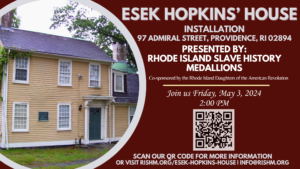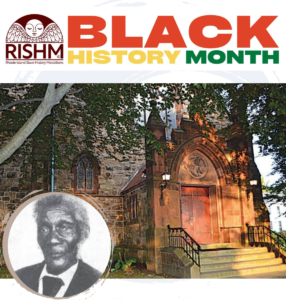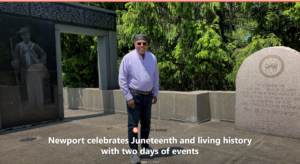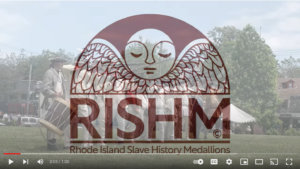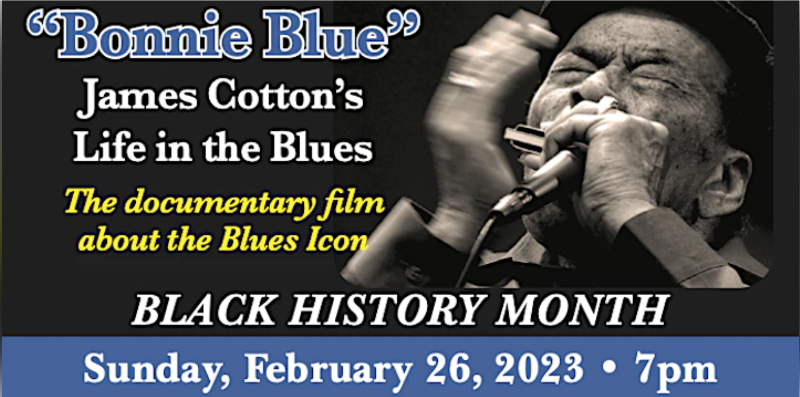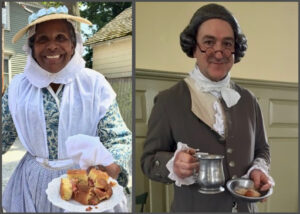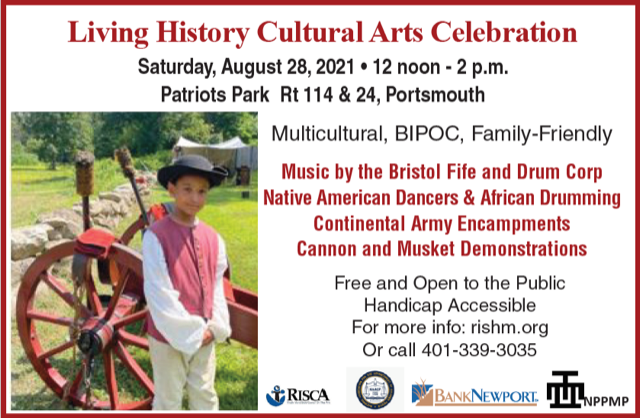RI Historic Map and RISHM
Take a tour of Rhode Island’s historic locations through the Rhode Island Slave History Medallion project.
loading map - please wait...
Rhode Island Cities in RISHM Statewide Public Awareness Program
Contributions to the History of Slavery in Rhode Island
Take a tour of Rhode Island’s historic locations through the Rhode Island Slave History Medallion project.
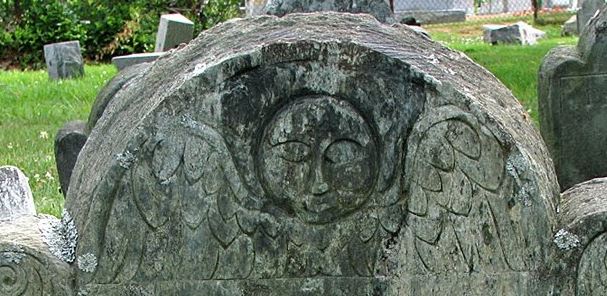
This is the original gravestone carved in Newport by Pompe Stevens, the enslaved artisan who crafted one of the first signed African-American pieces of artwork in North America in 1768 for his deceased brother Cuffe Gibbs.
The Rhode Island Slave History Medallion organization is a statewide public awareness program committed to marking those historic sites connected to the history of slavery in Rhode Island.
Slavery was the global economic engine prior to its abolition and Rhode Island’s role in this business of slavery was significant. By marking sites throughout the state that are connected to that past, we hope to make that history easily accessible by telling a more complete story of the cultural and economic development of the State of Rhode Island.
In each city or town, a QR coded Medallion with the history of its designated locations will appear on the website. The QR code on the Medallion will provide a link to this website with historical content about each location.
We welcome participation in the Rhode Island Slave History Medallion project. Please help us accomplish this landmark achievement in education.
Esek Hopkin’s House Installation Date Announced!
Come join us for RISHM’s upcoming Black History Month event February 25, 2024
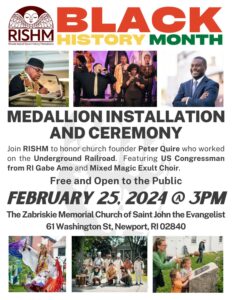
Black History Month Dedication February 25, 2024 St. John’s Episcopal Church
The Rhode Island Slave History Medallions (RISHM) is inviting the public to
celebrate Black History Month at a program honoring Black abolitionist and
church founder Peter Quire on Sunday, February 25 at 3PM at the historic
St. John the Evangelist Church, 61 Washington Street in Newport. The
event is free, open to the public, and a reception follows.
With speakers and gospel music, the event will feature US Congressman
Gabe Amo of RI speaking about Black History Month. RISHM Founder and Executive Director will speak about the history of Peter Quire, who worked with the Pennsylvania Quakers on the Underground Railroad freeing enslaved people, and his wife Harriet,
both lifelong advocates for equality who were leaders of the Black
community in Newport. The St. John’s Choir will perform with special guests
Mixed Majic Exult Choir.
RISHM will be installing a medallion at the church’s entrance and it will be
among the 14 markers installed across the state that tell the inclusive
stories of African and Indigenous Americans during the Colonial Era. In
Newport, medallions are marking the landscape at Bowen’s Wharf, Trinity
Church, and the W.E. Channing/Quamino House on School Street. Other
medallions being installed this year are at the Vernon House, Clarke St.,
and the Trinity School-Shiloh Baptist Church, School Street. Medallions
provide a QR code for scanning with a mobile phone, linking visitors to the
slave history archive at www.rishm.org . For more information, contact
RISHM director Charles Roberts at info@rishm.org.
Click here to discover more about St. John the Evangelist Episcopal Church and Peter Quire
Peter Quire and the Church of St John the Evangelist
Peter and Harriet Frances Quire, a free Black man and woman, held the first services of St.
John’s Parish above their cobbler shop. Before moving to Newport, Peter Quire worked with
the Quakers to free enslaved people in the Underground Railroad in Pennsylvania. Upon his
death in 1899, he bequeathed $419, his life savings, to founding the church.
The Public’s Radio Interview: Newport celebrates Juneteenth and living history with two days of events
RISHM celebrates a successful 1st Annual Newport Juneteenth
Black History Month: RISHM presents “Bonnie Blue: James Cotton’s Life in the Blues”
Click here to view the trailer for “Bonnie Blue”
For Black History Month, the RI Slave History Medallions presents the award-winning documentary film “Bonnie Blue: James Cotton’s Life in the Blues” on Sunday, February 26, 7PM at the Casino Theatre, 10 Freebody St., Newport.
Cotton, a virtuoso harmonica player, who brought the blues to worldwide prominence has been screened internationally and co-produced by James Montgomery. A live performance follows the film by the James Montgomery Blues Band with special guests Beehive Queen, Christine Ohlman and singer Kara McKee from The Voice.
A look back at our “Bonnie Blue” movie showing & live concert in gallery
RISHM Installation Ceremony at Trinity Church
Trinity Church and Slavery during the Colonial Period
Trinity Church was founded in 1698 as a mission of the Church of England. Early parishioners included slave owners and traffickers, such as George Gibbs II, who is interred in the Trinity Church graveyard.
Cuffe Gibbs, the slave of George Gibbs II, is buried in God’s Little Acre on Farewell Street in Newport. His brother, the enslaved artisan, Pompe Stevens, carved the original ‘Soul Effigy’ angel image, placed at this site location, for the gravestone of his deceased brother Cuffe, in 1768.It was the first signed African American decorative artwork to be made in North America.
Trinity Church, Sunday October 30, 2022, Queen Anne Square, Newport, RI
Barrington and the Early Roots of Slavery
Slavery in Barrington, Rhode Island
In 1653 settler-colonists laid claim to “Sowams,” the ancestral home of the Pokanoket. Though the Pokanoket never relinquished their claim, settler-colonists soon occupied the land, including modern-day Barrington. Among these settler-colonists were the Willet, Myles, and Browne families, who enslaved 14 Africans. By 1774, 57 of the town’s 601 inhabitants were enslaved, including 18 classified as Indigenous.
Rhode Island Slave History Medallion Installation Ceremony
October 2, 2022. Barrington Public Library & Town Hall
281 County Road, Barrington, Rhode Island
Juneteenth at Casey Farm, Sunday June 19, 2022
Historic New England’s Casey Farm
Historic New England’s Casey Farm is located on the ancestral homeland of the Narragansett people. By 1755, soon after this house was built, 19% of people in South County were enslaved. Casey Farm was one of many Rhode Island plantations that used forced labor by people of Indigenous and African descent to care for crops, animals, and domestic duties. Enslaved people allowed the farm to prosper, so centuries later, Historic New England could steward the land. The non-profit cultivates and conserves 300 acres of land with its circa 1750 farmhouse, nineteenth century barns and outbuildings, and miles of stone walls. The RISHM marker is located on the front lawn of the farmhouse.
Rocky Hill School 2022 Voices
Potowomut is known by the Narragansett as their sacred meeting and hunting grounds. Beginning In 1680, African and Indigenous people were enslaved by the Greene family to steward the land until 1779. The property was then purchased by the Brown family, who owned it for over a century before it became the campus of Rocky Hill Day School – The Voices Who Had No Voice..
Celebrate Black History Month 2022!
Link to full William Ellery Channing / Dutchess Quamino Story
WILLIAM ELLERY CHANNING • DUCHESS QUAMINO STORY
WILLIAM ELLERY CHANNING (c.1817 – December 1901)
William Ellery Channing’s was impassioned public speaker who
became known as the “Father of Unitarianism”. Channing served
as the minister of the prestigious Federal Street Church in Boston
from 1803 to 1842. His religious thoughts and writings were
among the chief influences on the New England
Transcendentalists, authors Ralph Waldo Emerson and Henry
David Thoreau.
He was an abolitionist. He may have been influenced by Duchess
Quamino who was his nanny in his early life. They fostered a lifelong friendship thereafter.
DUCHESS “CHARITY” QUAMINO (c. 1739 – June 1804)
Duchess “Charity” Quamino was a formerly enslaved woman who
worked as a nanny and cook in the household of William Ellery.
Duchess was also a talented baker, a wife and mother, and a rare
entrepreneur in the Era of Slavery, becoming well known as the
“Pastry Queen of Rhode Island.”
Duchess Quamino was born to a family on the Gold Coast of
Africa, in Senegal or Ghana, and was taken captive, sold into
slavery, and transported on the slave ship Elizabeth to Newport
where she became the property of attorney William Ellery and
his wife. Quamino grew into an entrusted nanny and excelled in
baking, a skill that would sustain her in later years.
Black History Month
Black History Month is an annual celebration of achievements by African Americans and a time for recognizing their central role in U.S. history. Also known as African American History Month, The event grew out of “Negro History Week,” the brainchild of noted historian Carter G. Woodson and other prominent African America
in 1926, Negro History week chosen on the second week of February to coincide with the birthdays of Abraham Lincoln and Frederick Doughlass. The event inspired schools and communities nationwide to organize local celebrations, establish history clubs and host performances and lectures
President Gerald Ford officially recognized Black History Month in 1976, calling upon the public to “seize the opportunity to honor the too-often neglected accomplishments of Black Americans in every area of endeavor throughout our history
The NAACP was founded on February 12, 1909, the centennial anniversary of the birth of Abraham Lincoln.
The Living History Cultural Arts Celebration Performance
On August 28th 2021, RISHM provided the community with a family-friendly gathering of BIPOC traditions and colonial history at Patriots Park in Portsmouth, sponsored in part by RISCA, BankNewport, the NAACP and the Newport Port Marker project.
Parents and their children shared in an unforgettable experience, an Act of Remembrance. They witnessed their history come to life before their very eyes. We are Building a New Tomorrow. One Child, One Family at a Time.
Living History Cultural Arts Celebration
Juneteenth, Linden Place, Bristol, Saturday June 19, 2021
THE NEW NATIONAL HOLIDAY, JUNETEENTH, A SHARED HISTORICAL COMMEMORATION.
At Linden Place, We Acknowledging the Land of the Enslavers George and James DeWolf, Blessed by the Algonquin, Pokanoket Wampanoag tribes with historic documentation from Roger Williams University. As Senator Sheldon Whitehouse said, “This may be Bristol County but it’s Wampanoag Country”. Truly a A Spiritual Healing took place along our new Nationally Designated Historic Scenic Byway in Bristol.
Juneteenth Weekend, DeWolf Tavern, Bristol, Monday June 21, 2021
THE NEW NATIONAL HOLIDAY, JUNETEENTH, A TIME OF RACIAL HEALING
On June 21, at the DeWolf Tavern, DeWolf family descendants, Dain and Constance Perry screened the documentary “Traces of Trade, a film tracing their journey back to African with nine of the DeWolf family members willing to tell the story of their forefathers, the largest slave-trading family in U.S. history. The Perry’s led an audience on a soul searching journey to discover that moment within themselves that strives to find our common humanity. That moment is the Path to Racial Healing.
An Act of Remembrance.
Over 100 enthusiastic fans attended the Medallion Installation Ceremony in
Jamestown on May 22, 2021.
Medallion Aimed to Teach Slave Related History in RI
The Beloved Community at RISHM.org
Installation Ceremony at Smith’s Castle, North Kingstown, RI
Saturday, October 10, 2020 – 10am to 11am
55 Richard Smith Drive, North Kingstown, RI
This dedication featured remarks by RISHM director Charles Roberts, Smith’s Castle Vice-president and Education Committee chairperson Robert A. Geake and members of their education committee. A blessing of the land in the original Narragansett language was given by Loren Spears of the Tomaquag Museum. The Mixed Magic Exult Gospel Choir will perform spiritual tributes. Members of the Rhode Island First Black Regiment will honor the enslaved Patriots with a musket salute. This program was made possible by the Rhode Island Slave History Medallions organization and the Friends of Smith’s Castle and Preserve RI. For more information: Smith’s Castle, North Kingstown

